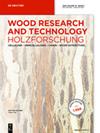单宁酸浸渍预处理对热处理杉木尺寸稳定性和化学成分的影响
IF 1.6
3区 农林科学
Q2 FORESTRY
引用次数: 0
摘要
热处理是提高木材尺寸稳定性的有效方法,但通常需要较高的温度。为了实现低温热处理,本研究采用了浸渍了 10 % 单宁酸(TA)的木材样本,并在不同初始含水率水平下考察了热处理后木材尺寸稳定性和化学成分的变化。结果显示,TA-10 %-HT 组的尺寸稳定性更强。具体来说,切向和径向湿膨胀分别降低了 21.7% 和 11.8%。傅立叶变换红外光谱和 XRD 分析表明,单宁酸的存在催化了半纤维素的降解。此外,水分含量的增加导致 TA 离子化,酸性增强,进一步影响纤维素降解。热重分析表明,TA 通过降低木材成分的初始分解温度和增加木材残重,影响了热处理材料的热稳定性。总之,使用 TA 浸渍和含水率进行预处理可显著提高杉木的尺寸稳定性,并改变其化学成分。这种方法具有相当大的潜力,可在热处理过程中通过低能耗方法提高木材性能,扩大木材的实际应用范围。本文章由计算机程序翻译,如有差异,请以英文原文为准。
Effects of tannin acid impregnated pretreatment on dimensional stability and chemical composition of heat-treated Chinese fir
Thermal treatment is an effective method for improving the dimensional stability of wood; however, it typically requires high temperatures. To achieve low-temperature heat treatment, this study employed wood samples impregnated with 10 % tannin acid (TA) and examined their changes in dimensional stability and chemical components after heat treatment at various initial moisture content levels. The results revealed that the TA-10 %-HT group exhibited enhanced dimensional stability. Specifically, both the tangential and radial moisture swelling decreased by 21.7 % and 11.8 %, respectively. FTIR and XRD analysis indicated that the presence of tannin acid catalytically facilitated the degradation of hemicellulose. Moreover, an increase in moisture content resulted in the ionization of TA, amplifying acidity and further affecting cellulose degradation. TGA demonstrated that TA impacted the thermal stability of heat-treated materials by lowering the initial decomposition temperature of wood components and increasing the residual weight of wood. Overall, pretreatment with TA impregnation and moisture content significantly improved the dimensional stability of Chinese fir wood and altered its chemical composition. This approach holds considerable potential for enhancing wood properties through a low-energy consumption method during the heat treatment process, expanding the practical application of wood.
求助全文
通过发布文献求助,成功后即可免费获取论文全文。
去求助
来源期刊

Holzforschung
工程技术-材料科学:纸与木材
CiteScore
4.60
自引率
4.20%
发文量
83
审稿时长
3.3 months
期刊介绍:
Holzforschung is an international scholarly journal that publishes cutting-edge research on the biology, chemistry, physics and technology of wood and wood components. High quality papers about biotechnology and tree genetics are also welcome. Rated year after year as one of the top scientific journals in the category of Pulp and Paper (ISI Journal Citation Index), Holzforschung represents innovative, high quality basic and applied research. The German title reflects the journal''s origins in a long scientific tradition, but all articles are published in English to stimulate and promote cooperation between experts all over the world. Ahead-of-print publishing ensures fastest possible knowledge transfer.
 求助内容:
求助内容: 应助结果提醒方式:
应助结果提醒方式:


